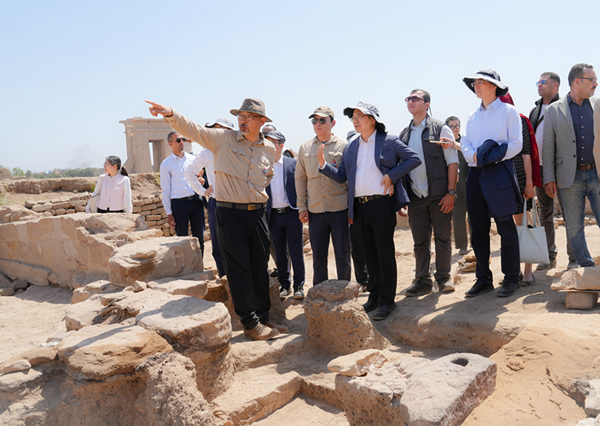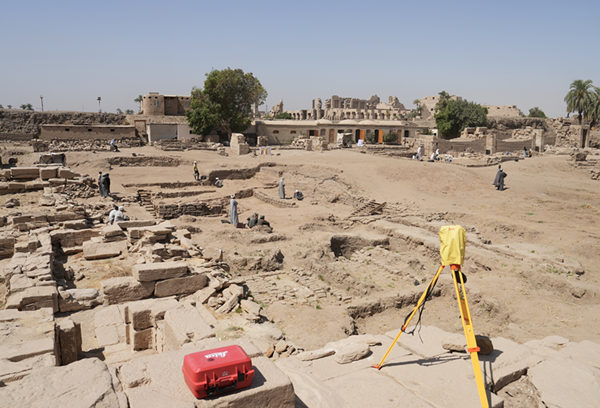

LUXOR—As part of his recent visit to Egypt, Gao Xiang, president of the Chinese Academy of Social Sciences (CASS), conducted a site inspection from April 18 to 19 at the Temple of Montu in the northern Karnak complex in Luxor, where a joint China-Egypt archaeological excavation is underway. During the inspection, Gao visited the onsite archaeological team from CASS’s Institute of Archaeology in Egypt and inaugurated a “Research Center for Archaeology of Egypt,” a step aimed at deepening CASS’s archaeological engagement in the region.
At the excavation site, Gao was briefed on the progress of the joint project and commended the professional and collaborative spirit displayed by both Chinese and Egyptian teams, pointing out that the project’s fruitful outcomes stem from their dedication, unity, and close cooperation. Looking ahead to the next stage of archaeological work, Gao outlined three key areas of focus: first, continuing current projects while developing scientific excavation plans for other significant sites; second, establishing a collaborative mechanism for fieldwork and academic research, enhancing relic restoration through technologies such as artificial intelligence, and strengthening historical interpretation; third, establishing a regular talent exchange program. He added that CASS stands ready to offer Chinese language training and study opportunities in China for Egyptian technicians.
Gao also underscored that the Institute of Archaeology at CASS—one of the world’s largest, most capable, and most specialized archaeological institutions—is prepared to increase funding and technological investment to boost China-Egypt archaeological collaboration. The joint projects, he said, can serve as platforms for promoting global awareness of their archaeological achievements and for sharing compelling narratives of Egypt’s history and civilization.

CASS President Gao Xiang inspects the archaeological site of the Temple of Montu in the northern Karnak complex, Luxor, Egypt, on April 19. Photo: Wang Zhou/CSSN

The archaeological site of the Temple of Montu Photo: Wang Zhou/CSSN
Mohamed Abdel Badie, head of the Egyptian, Greek, and Roman antiquities sector at the Supreme Council of Antiquities in Egypt, and Abdelghafar Wagdy, director of the bureau of antiquities in Luxor at the Egyptian Ministry of Tourism and Antiquities (MoTA), accompanied Gao throughout his inspection. They engaged in in-depth discussions on enhancing cooperation in field archaeology, advancing technical exchanges in relic restoration, and refining the joint training framework for archaeological professionals.
Prior to the site inspection, Gao held talks with Egypt’s Deputy Minister of Tourism and Antiquities Youmna El-Bahar. The two reached a key consensus on advancing inter-civilizational mutual learning and expanding people-to-people exchanges. Gao emphasized that as cradles of human civilization, China and Egypt possess abundant historical and cultural resources and enjoy favorable conditions for academic cooperation. In a world undergoing profound changes unseen in a century, he said, ancient civilizations represented by China and Egypt must continue to deepen inter-civilizational dialogue, drawing development momentum from their historical legacies and resisting the influence of Western-centrism on global development. He called for replacing zero-sum mindsets with win-win cooperation and offering constructive pathways to address the world’s deficits in development, trust, governance, and peace.
Gao highlighted the sound partnership between CASS and Egypt’s MoTA, stressing that intensified collaboration in joint archaeological efforts in Luxor could further elevate China-Egypt cultural exchanges, foster deeper mutual learning between ancient civilizations, and strengthen the foundation for building a human community with a shared future.
Deputy Minister El-Bahar praised the achievements of the CASS archaeological team in Luxor, underscoring the importance of Egypt-China archaeological cooperation not only for bilateral academic exchanges but also for mutual learning among global civilizations. Going forward, she affirmed MoTA’s commitment to deepening its partnership with CASS and swiftly implementing the outcomes of their discussions, with a view to injecting sustained civilizational impetus into the development of the Egypt-China comprehensive strategic partnership.
While inaugurating the “Research Center for Archaeology of Egypt,” Gao asserted that the establishment of the center marks a new phase of institutional construction for China-Egypt civilizational dialogue. He stated that Chinese archaeological institutions are guided by an open and inclusive philosophy, and that the Institute of Archaeology at CASS, while rooted in China, belongs to the world. In the future, the institute aims to build multidimensional systems for civilizational interpretation through projects in Egypt, showcasing exemplary models of archaeological cooperation between ancient civilizations to the international community.
During his visit to the Luxor field office of the CASS archaeological team, Gao offered a forward-looking perspective on archaeology: “We are not digging into the past, but constructing civilizational dialogue for the future.” He praised the team’s dedication and lofty ideals, calling them “the most admirable members of CASS,” and urged administrative departments to assume greater responsibility for logistical support, advocating for policy preference toward frontline personnel where possible.
Gao also proposed taking projects in Egypt as a “test field” for building an “innovative research team for early civilizations,” one that breaks through disciplinary silos and enables effective cross-national collaborative research. He emphasized that the mission of archaeology is not to restore historical scenes, but to build new bridges for inter-civilizational dialogue, calling on the team to strengthen their interpretive capabilities and sense of mission.